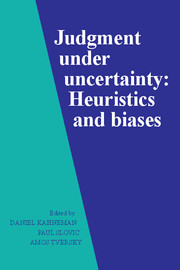Book contents
- Frontmatter
- Contents
- List of contributors
- Preface
- Part I Introduction
- Part II Representativeness
- 2 Belief in the law of small numbers
- 3 Subjective probability: A judgment of representativeness
- 4 On the psychology of prediction
- 5 Studies of representativeness
- 6 Judgments of and by representativeness
- Part III Causality and attribution
- Part IV Availability
- Part V Covariation and control
- Part VI Overconfidence
- Part VII Multistage evaluation
- Part VIII Corrective procedures
- Part IX Risk perception
- Part X Postscript
- References
- Index
5 - Studies of representativeness
Published online by Cambridge University Press: 05 May 2013
- Frontmatter
- Contents
- List of contributors
- Preface
- Part I Introduction
- Part II Representativeness
- 2 Belief in the law of small numbers
- 3 Subjective probability: A judgment of representativeness
- 4 On the psychology of prediction
- 5 Studies of representativeness
- 6 Judgments of and by representativeness
- Part III Causality and attribution
- Part IV Availability
- Part V Covariation and control
- Part VI Overconfidence
- Part VII Multistage evaluation
- Part VIII Corrective procedures
- Part IX Risk perception
- Part X Postscript
- References
- Index
Summary
Daniel Kahneman and Amos Tversky have proposed that when judging the probability of some uncertain event people often resort to heuristics, or rules of thumb, which are less than perfectly correlated (if, indeed, at all) with the variables that actually determine the event's probability. One such heuristic is representativeness, defined as a subjective judgment of the extent to which the event in question “is similar in essential properties to its parent population” or “reflects the salient features of the process by which it is generated” (Kahneman & Tversky, 1972b, p. 431, 3). Although in some cases more probable events also appear more representative, and vice versa, reliance on the representativeness of an event as an indicator of its probability may introduce two kinds of systematic error into the judgment. First, it may give undue influence to variables that affect the representativeness of an event but not its probability. Second, it may reduce the importance of variables that are crucial to determining the event's probability but are unrelated to the event's representativeness.
The representativeness concept has occasionally been criticized as too vague and elusive, presumably because it lacks a general operational definition. This is not to say, however, that it is impossible to assess representativeness independently of probability judgments, a conclusion which has often been implied by the critics.
- Type
- Chapter
- Information
- Judgment under UncertaintyHeuristics and Biases, pp. 69 - 83Publisher: Cambridge University PressPrint publication year: 1982
- 30
- Cited by

